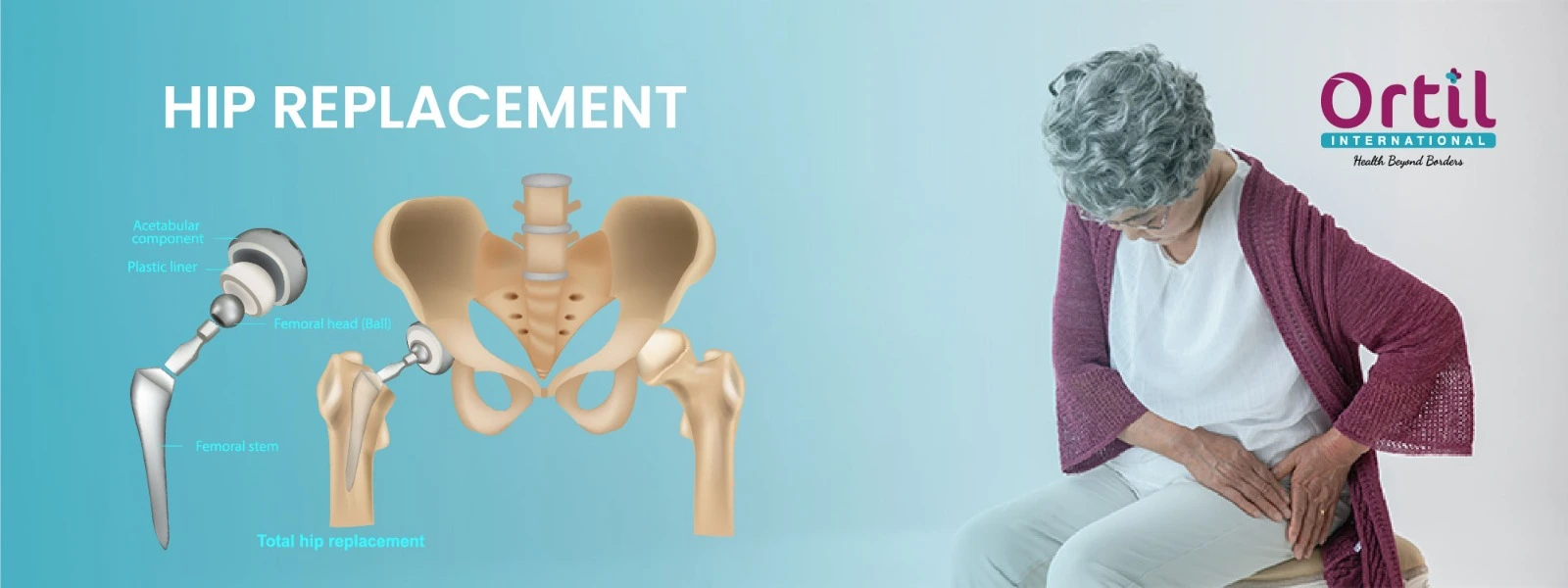Complete Guide of Hip Replacement Surgery in India
Hip replacement surgery is one of the most common joint surgery performed in India. When symptoms like pain and limited mobility cannot be treated with medications and physical therapy, surgical treatments are used to replace the hip joint with a prosthesis, which acts similarly to a typical hip joint in functioning.

The hip replacement procedure is a widely used surgical option due to its good results and high success rates in India. Let’s explore more about this procedure:
What is Hip Replacement Surgery?
A hip replacement surgery is a procedure in which your partially or completely damaged hip joint is replaced with a prosthesis. It is performed for the symptoms like chronic pain and low quality of life. Different types of prostheses are used for hip replacement, including metallic, plastic, and ceramic prostheses. Each type of prosthesis is used according to your needs and preferences.
The most common condition in which hip replacement surgery is performed is hip joint osteoarthritis.
Types of Hip Replacement Surgery
Hip replacement surgery can be of many types. According to your specific needs, your doctor chooses the best option for you according to your damage.
Types of Hip Replacement Surgery according to the severity of damage
Total Hip Replacement : In this surgery, your total damaged hip joint is replaced with an artificial one to reduce pain and improve movement.
Partial Hip Replacement : In this procedure, only the damaged part of the hip joint is replaced with a prosthesis. This procedure helps to preserve the healthy part of your hip joint.
Hip Resurfacing : Instead of replacing the entire hip joint, this surgery smoothens the damaged surfaces of your hip joint with metal implants.
Revision Hip replacement : This surgery is usually performed to replace a previous hip replacement that has failed and now requires removing and replacing the old components with new ones.
Types of Hip Replacement Surgery according to the surgical approach
Your doctor can access the hip from different angles during the hip replacement surgery. Some common approaches are described below:
- Anterior approach (Surgeons access from the front of the hip joint)
- Lateral approach (Surgeons access from the side of the hip joint)
- Posterior approach (Surgeons access from the back of the hip joint)
How do you know if you need a hip replacement?
When your chronic hip pain and limited mobility affect your quality of life severely, then you should know that now you need hip replacement surgery. You have a low quality of life if you have the following signs:
- Unable to sleep peacefully because of the pain.
- Unable to do your favorite tasks.
- You must refrain from performing activities of daily living like going upstairs or doing hard activities.
- You are not able to perform your occupational tasks due to chronic pain.
- You have limited social interaction due to chronic pain.
Healthcare providers don’t decide on surgical interventions at the start; they provide treatment with non-surgical interventions like medications and physical therapy. When these treatments do not show any response, then you may need hip replacement surgery.
How Should I Prepare for Hip Replacement Surgery?
You can prepare yourself for hip replacement surgery by following the guidelines mentioned below:
- Get a consultation from your healthcare provider about hip replacement surgery.
- Learn about the different options of hip replacement surgery and choose the most suitable option for you according to your needs.
- Choose the surgical option and learn about the possible complications and recovery process.
- Consider how surgery can affect your daily activities and occupational tasks.
- Plan your work according to the time you need to recover from surgery.
- Have sessions of physical therapy to strengthen your hip muscles so that it can boost your recovery process after the surgery.
- Practice using crutches and walkers before walking right after the surgery.
- Educate your family and friends so that they can help you in the recovery process.
- Prepare your home and make it easier for you to move during the recovery process.
- Make it easier to move around by rearranging furniture, removing rugs, and adding handrails in the bathroom.
What are the Risks of Hip Replacement Surgery?
Although hip replacement is a safe procedure, it still has some chances of complications during or after the surgery. Some of the risks of hip replacement surgery are described below:
Infection : There is a risk of developing an infection at the site of incision. The infection can also occur late after the surgery.
Blood Clots : The limited mobility after hip replacement can cause blood clot formation in the legs or lungs.
Dislocation : The new hip joint may become dislocated if it is not properly positioned or if certain movements are made.
Fracture : The bone around the implant may break during or after surgery and can cause complications.
Nerve and Blood Vessel Damage : During surgery, nearby nerves or blood vessels may be injured, which can further cause the complication of numbness and weakness.
Difference in Leg Length : Sometimes, the new hip joint can make one leg slightly longer or shorter than the other and create a leg length discrepancy.
Loosening of the Implant : Over time, the artificial joint may loosen from the bone, which may require revision hip replacement surgery.
Success Rate for Hip Replacement in India
Total hip replacement is a significant procedure in which damaged parts of the hip joint are replaced with artificial implants or prostheses. The damaged area or part of the hip joint is resurfaced and fitted with these implants with the help of specialized tools. This artificial hip allows for almost normal function of the new joint.
Some of the important points about the success rate of hip replacement in India are:
- The implants typically remain functional for up to 15 years across all age groups and conditions.
- Hip replacement surgeries are generally safe and have a high success rate of 90% to 99%.
- The success rate is around 90-95% after 10 years of surgery.
- The success rates become 80-85% after 20 years of hip replacement surgery.
You can experience better outcomes and improved quality of life after undergoing this procedure because India has a remarkable healthcare system due to the availability of advanced technologies, custom-designed implants, and skilled surgical teams.
Recovery Process of Post-Hip Replacement Surgery in India
Hip replacement recovery begins immediately after surgery. Patients are encouraged to start moving around as soon as possible. If there are no other health issues, patients can be discharged once they can walk, climb stairs, and get in and out of a car independently.
The surgeon, physical therapist, or occupational therapist guides you throughout the recovery process and plans exercises and medications to improve the outcomes.
During recovery, it is important to:
- Keep the surgical area clean and dry as instructed by the doctor.
- Take medications for the prevention of infection and blood clot formation.
- Attend all follow-up appointments.
- Participate in physical therapy and also do home exercises.
- Elevate the leg and use ice to reduce swelling.
Importance of Rehabilitation in the Recovery Process
Rehabilitation after total hip replacement involves following specific protocols that are designed for you according to your needs and capacity. Rehabilitation and exercises in physical therapy improve the outcomes of surgery and also help in your recovery period. Physical therapists plan a set of exercises for you to perform and strengthen your muscles, which also improves the circulation in the hip joint, which is necessary for normal recovery.
Conclusion
In conclusion, hip replacement surgery in India offers high success rates but it is very important to follow complete guidelines to be able to recover soon after surgery and go back to normal activities of daily living just like before the disease.
FAQ’s of Hip Replacement Surgery in India
How Long does Hip Replacement Surgery Take?
Hip replacement surgery can take up to 2 to 3 hours. But usually, it depends on the type of procedure performed.
How Long does it take to recover from a Hip Replacement?
Recovery after hip replacement can take 2 to 3 months. But it depends on the condition of each patient. Younger patients usually recover faster.
What are Hip Implants Made of ?
Hip implants are made of metal, ceramic, and plastic.
What Should I look for in a Hip Replacement Surgeon?
You should check honest reviews of hip replacement surgeons, their experience, and their skills.
What Activities Should I avoid after Surgery?
You should avoid following activities after hip replacement surgery:
- Reduce stair and car trips to a minimum.
- Avoid bending hips or knees beyond 90 degrees.
- Do not cross legs.
- Refrain from lifting the leg to put on socks.


























